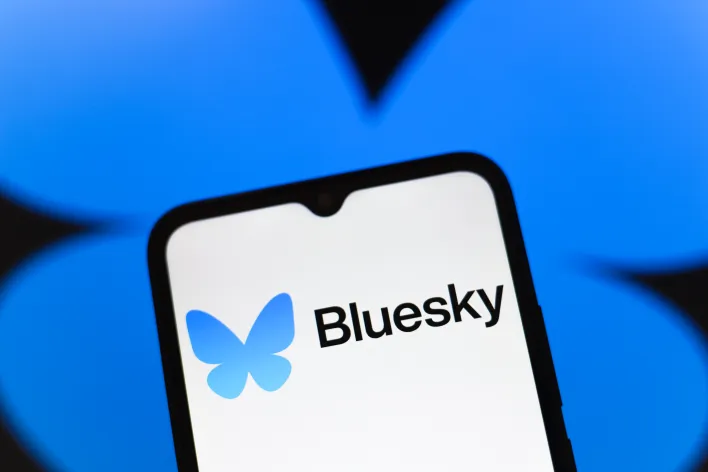What Is Bluesky’s New Verification System and How Does It Work?
If you’re wondering how Bluesky’s verification system works or who gets a blue checkmark , you’re not alone. Since its official announcement in April 2025, Bluesky’s decentralized approach to account verification has sparked widespread curiosity. Unlike traditional platforms like Twitter (before Elon Musk’s paid model), Bluesky allows third-party organizations—called Trusted Verifiers—to independently authenticate users. This system aims to ensure that notable individuals and organizations are accurately represented while maintaining the platform’s commitment to decentralization.
Image Credits:Jaque Silva/NurPhoto/ Getty ImagesBut who qualifies as “notable,” which organizations have been granted Trusted Verifier status, and what does this mean for self-verification? Let’s break it down.
Which Organizations Are Trusted Verifiers—and Why Were They Chosen?
One of the most pressing questions surrounding Bluesky’s rollout is: Which organizations can verify accounts besides Bluesky itself? So far, only a handful of entities have been given Trusted Verifier status, including The New York Times, Wired, and The Athletic. These organizations were likely chosen based on their credibility and reach within the media landscape.
However, Bluesky hasn’t disclosed much about the selection process or whether additional partners are lined up. CEO Jay Graber mentioned that news organizations agreeing to verify their journalists make up the initial group, but broader applications are expected later. For now, this limited rollout leaves many eager to see how decentralized verification evolves over time.
Is Verification an Indicator of Trustworthiness—or Just Notability?
Another common query revolves around the meaning behind the blue-and-white badge: Does being verified mean someone is trustworthy? Bluesky’s documentation suggests that verification focuses on authenticating “authentic and notable” accounts. However, the criteria for determining “notability” remain unclear.
This ambiguity mirrors challenges faced by previous systems, such as Twitter’s pre-paid verification era. Users often equated the blue checkmark with importance or influence, leading to frustration when they didn’t qualify. While Bluesky strives to avoid these pitfalls, it seems the platform is still defining its stance on this issue.
Why Are Some Accounts Verified While Others Aren’t?
It’s natural to compare verified accounts and ask: Why is CNN verified but not Politico? At this stage, Bluesky emphasizes that its verification rollout is gradual. Don’t assume omission implies anything negative—it simply reflects the early stages of implementation.
The company plans to expand its efforts, potentially allowing more organizations and individuals to apply for verification in the future. Until then, spotting a blue checkmark shouldn’t be interpreted as definitive proof of superiority or exclusivity.
What Happens to Self-Verification Through Domains?
Prior to introducing its formal verification process, Bluesky offered users the option to link their profiles to custom domains—a feature that remains available. Over 270,000 accounts have already adopted this method, making it another layer of identity confirmation.
While domain-based verification isn’t mandatory for receiving a blue checkmark, Bluesky strongly encourages official organizations and public figures to utilize it. This dual-layer approach reinforces authenticity without forcing all users into a single pathway.
What About Unofficial Labelers Like Hunter Walker and Guan Yang?
Before Bluesky’s official system launched, independent labelers played a crucial role in identifying legitimate accounts. Figures like journalist Hunter Walker and activist Guan Yang created unofficial badges for diverse groups, from politicians to small media outlets.
For now, these labels persist, but their long-term viability is uncertain. Walker expressed hope that Bluesky would consolidate verification under one clear source, signaling a potential shift away from grassroots efforts.
Can Trusted Verifiers Abuse Their Privileges?
A critical concern among users is accountability: What happens if a Trusted Verifier acts unethically? While Bluesky hasn’t released detailed guidelines yet, CTO Paul Frazee assured users that the company could intervene if necessary. This safeguard suggests Bluesky is prepared to address misuse, even if specifics remain vague.
Decentralized Verification’s Promise and Challenges
Bluesky’s innovative approach to verification offers exciting possibilities for fostering trust and transparency in social media. By empowering external organizations to participate, the platform aligns with its decentralized ethos. Yet, questions linger about scalability, fairness, and enforcement mechanisms.
As Bluesky continues refining its system, staying informed will help users navigate this evolving landscape. Whether you’re seeking verification yourself or simply curious about the mechanics, understanding these nuances ensures you’re ahead of the curve.
So, keep an eye on updates—and maybe secure your domain name sooner rather than later!


